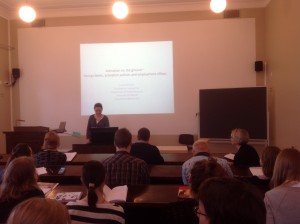Lotta Haikkola, Daria Krivonos, Elina Paju and Lena Näre participated in Sociology Days Conference in the University of Jyväskylä.
Lotta Haikkola and Daria Krivonos chaired a Work and Precarity in a Mobile World workshop and presented their paper “Disrupted Biographies and Uncertain Futures – An Ethnography of Labour Market Activation”. The paper explored how activation measures are experienced by young unemployed migrants in Helsinki, Finland and analysed these experiences in the context of young people’s fragmented school-to-work transitions in post-Fordist societies. Daria and Lotta focused on misrecognition of young migrants’ skills and how nationalist construction of labour market and education in Finland fragments biographies of young migrants.
Daria Krivonos also presented her paper in Sociology of Migration workshop, which was chaired by Lena Näre and Päivi Pirkkalainen. In her paper “Racialised Boundaries of Welfarism and Belonging: Young Unemployed Russians’ Uses of Whiteness in Finland” she talked about the uses of racism by young unemployed Russian-speaking migrants in Helsinki. Daria argued that the construction of spaces of white privilege helps discriminated migrants defend and advance their claims for a better reception vis-à-vis other groups – in particular, claim respected worker identities.
Elina Paju talked about temporalities and dreaming in context of youth activating workshops in her presentation “Deaming the Future: Temporalities, Bodies and Selves in Youth Activating Workshops”. Elina argued that the practices and ideology of the workshops make a distinction between the body-in-the-present and self-in-the-future. She discussed dreaming as an important practice in the workshops, which serves to create and govern one’s self as a continuous, linear temporal duration.
In the end of the conference, Lena Näre participated in the panel discussion on Sociology and Migration.
The abstracts of the papers presented in Sociology Days can be found here .

